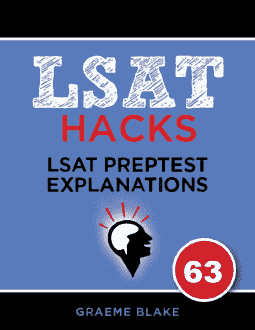QUESTION TEXT: Political philosopher: A just system of taxation would…
QUESTION TYPE: Flawed Parallel Reasoning
CONCLUSION: Each person should be taxed solely in proportion to their income.
REASONING: Each person’s contribution should be based on how well society serves that individual’s interests. Wealth is the most objective way to determine how well society serves someone.
ANALYSIS: This argument switches terms. Wealth is how much money and capital you have. Income is how much money you’re earning.
You’d be fine with having an income of zero if you have two billion dollars in the bank. So if wealth is the most objective measure, taxing income will miss the mark. We should tax people directly on wealth. The right answer must make a similar concept shift.
___________
- CORRECT. Speed is how fast a car can go. Acceleration is how quickly a car can speed up. Those are different. A car could accelerate very quickly but have a low top speed. This is the same concept shift error from the stimulus. It matches the difference between an absolute amount of something (wealth/speed) and how quickly you gain it (income/acceleration). (See more on absolute vs. relative)
- We should be granted autonomy in proportion to maturity. Giving “complete” autonomy to those at a high school level is too much – “high school student” definitely isn’t the highest level of maturity. This answer doesn’t match the concept shift from the stimulus.
- This has similar language to the stimulus but it doesn’t make the same mistake. The mistake here is assuming that corporations get more subsidies just because they get some subsidies. The argument didn’t say what subsidies citizens get.
- This doesn’t make the error from the stimulus, but it is a bad argument. We should be taxing incomes themselves, not the activities. Taxing the activities will probably reduce them.
- This is a bad argument, but it doesn’t make the total amount/speed of gain concept shift from the stimulus. The reason this argument is bad is that there could be people outside hospitals with more serious health needs.


I think you are missing the word “say” in the last sentence here:
This has similar language to the stimulus but it doesn’t make the same mistake. The mistake here is assuming that corporations get more subsidies just because they get some subsidies. The argument didn’t (SAY) what subsidies citizens get.
Yes, that’s correct! Thanks for catching this, and the page has been updated.
Hey Graeme,
Could we also look at this in terms of a “whole/part” flaw? That imagining “wealth” as the overall measure leads to erroneously measuring an individual’s income? Just like in the correct answer, seeing that “speed” is the overall danger means testing an individual car’s acceleration?
No, I think that’s separate. Whole/part is something like: This car can accelerate quickly, so every individual part of it can accelerate quickly.
Ok- thanks. I guess I have been having trouble pinpointing the right way to ‘abstract’ the question stimuli. I feel very close to a breakthrough but I make the wrong assumptions sometimes.